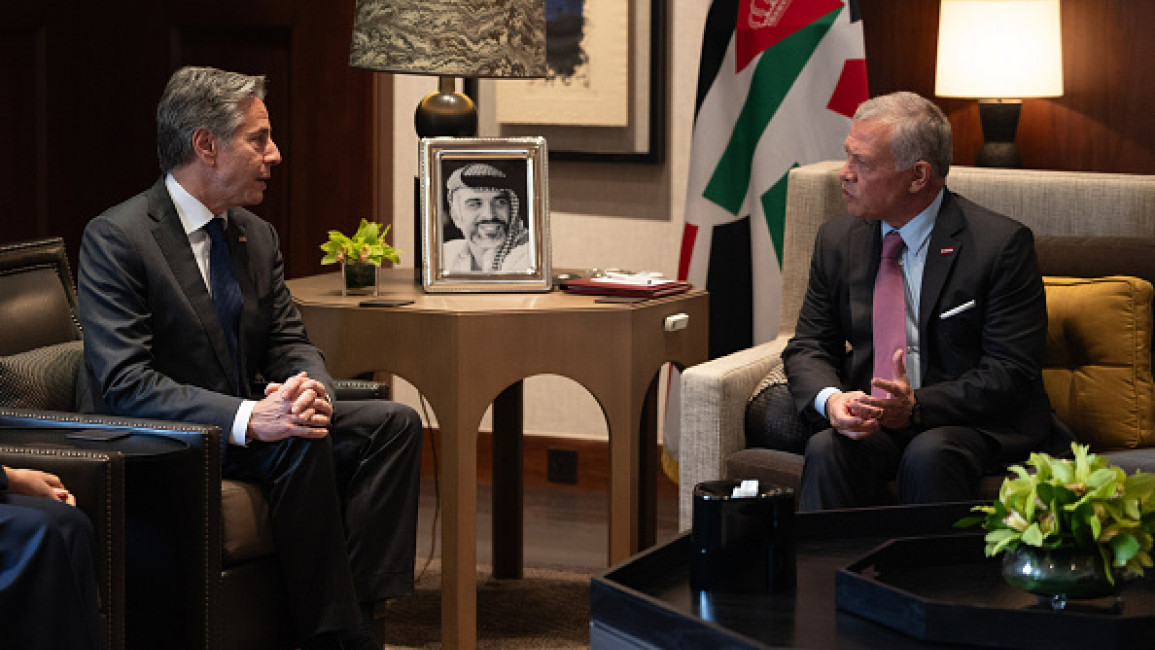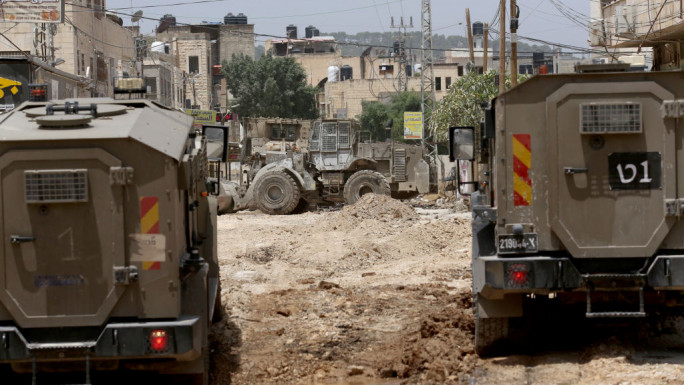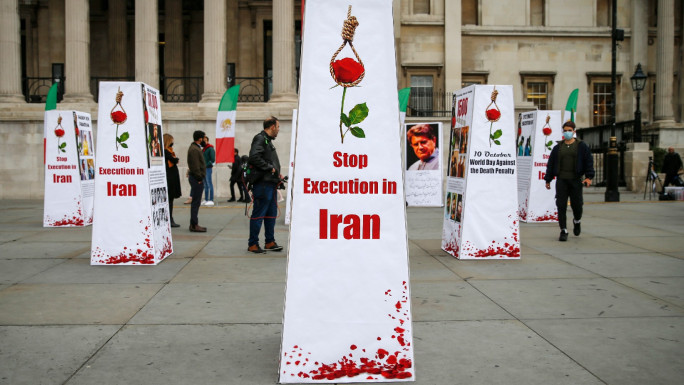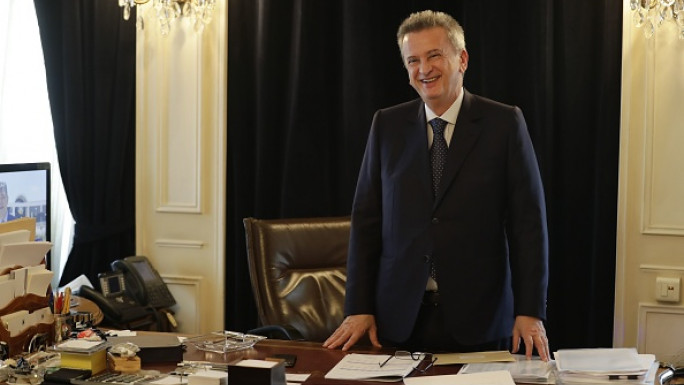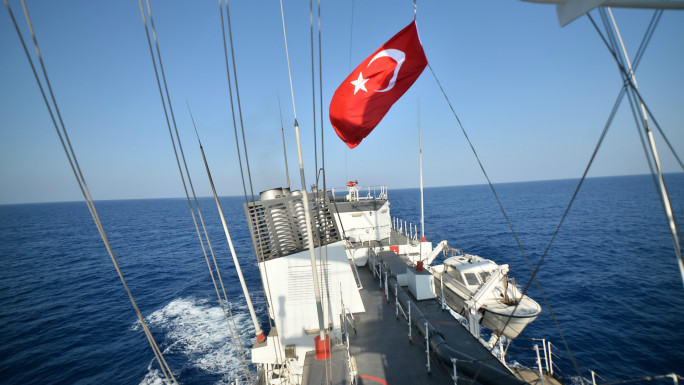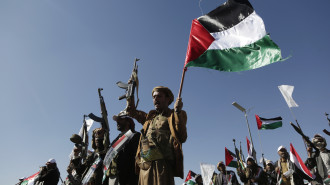
Why NATO opened its first Middle East office in Jordan

A NATO liaison office is opening in Jordan. At a summit in Washington earlier this month, the Transatlantic Alliance released a statement saying that the development constituted “a natural progression of the longstanding relationship between NATO and Jordan” and praised the country “as a beacon of stability in both regional and global contexts”.
The move has led to countless debates among analysts about the reasons for opening an office in Amman and the regional and global implications, with different interpretations of its significance against the backdrop of the Gaza war and other conflicts and tensions in the region.
Yet, it is clear that this development underscores the extent to which both Jordan and the West value their security cooperation.
Jordan-NATO relations
It was not necessarily a surprise that Amman was the city where the Transatlantic Alliance chose to open its first liaison office in the region. Jordan and NATO have a deep partnership going back many years. This new office will serve to bolster such cooperation throughout the future.
Jordan-NATO coordination in various areas such as crisis management, counterterrorism, and cybersecurity will likely elevate to higher levels in this upcoming period.
The Jordanian Armed Forces will probably receive more technical support and advanced technology from NATO. For Amman, such support can prove important when it comes to countering growing threats to Jordan’s national security amid a period of regional turmoil and worsening geopolitical instability.
“Jordan has always had strong military ties with the West. It relied heavily on British military support in its early years, and both King Hussein and King Abdallah II studied at Sandhurst,” Gordon Gray, the former US ambassador to Tunisia, said in an interview with The New Arab.
“The United States designated Jordan as a Major Non-NATO ally in 1996. It has provided Jordan with over USD 31 billion in assistance since establishing diplomatic relations in 1949, and in 2022 committed to providing USD 1.45 billion of aid annually through 2029.”
Since the 1990s, Jordan, along with Algeria, Egypt, Israel, Mauritania, Morocco, and Tunisia, has been a member of NATO’s Mediterranean Dialogue (MD).
When some NATO members took military action against Libya amid the 2011 Arab Spring, Jordan was one of a few Arab states that participated in Operation Unified Protector. Additionally, Jordan’s military and NATO forces have operated together on the ground in Afghanistan and Kosovo.
“The decision to open a NATO liaison office in Jordan says a lot about the fact that Jordan is a strong, reliable, and steady ally of all NATO members and even in a bipartisan way within the biggest NATO member, the US,” Dr Daoud Kuttab, a former professor at Princeton University and the founder and former director of the Institute of Modern Media at al-Quds University in Ramallah, told TNA.
The opening of this office in Amman speaks to the ways in which Jordan is “absolutely crucial to the stability and security of the Middle East region as a whole” and also “serves as an invaluable hub for military and, above all, intelligence coordination between many actors that don't usually collaborate that closely,” said Dr Hussein Ibish, a senior resident scholar at the Arab Gulf States Institute in Washington, in a TNA interview.
"Everyone that values security and stability in the Middle East needs Jordan to be Jordan and do what Jordan does. The NATO liaison office is a perfect example of the quiet but essential functions that Jordan performs in this regard,” he added.
Wolfgang Pusztai, a senior advisor at the Austrian Institute for European and Security Policy (AIES), spoke to TNA about the significance of Jordan’s support for NATO, which has taken various forms over the years.
“Jordan does not only offer very high-level training facilities - in particular the ‘King Abdullah II Special Operations Training Center’ (KASOTC) - but is also a valued partner in the fight against ISIS,” explained Pusztai.
“Furthermore, Jordan might also assume a role in supporting NATO’s (Training) Mission in Iraq (NMI) as something like a rear area for this mission, which is a non-combat capacity building and advisory mission. In the past, a number of ‘train-the-trainer' courses for Iraqi security and military personnel had been conducted in Jordan within the framework of NMI,” he added.
But given that the US and the rest of NATO have other close allies in the Middle East, it is worth asking why the Western Alliance decided to open this liaison office in Jordan as opposed to another Arab state.
While noting the West maintains “equally good relations” with Gulf Cooperation Council (GCC) members, Patrick Theros, the former US ambassador to Qatar, told TNA that he suspects that “the other countries (e.g., Qatar, UAE, Bahrain), where NATO might have located, did not want the attention right now”.
|
|
Concerns about a backlash
Almost ten months into Israel’s barbaric war on Gaza, there are powerful emotions felt across the Arab world, with levels of public anger and outrage sky-high.
Therefore, it is reasonable to raise questions about how the general population in Jordan and the public in other regional countries will view the NATO liaison office in Amman, especially given much chatter on social media about the office’s opening being related to the war in Gaza.
Many experts, however, do not believe that the Transatlantic Alliance’s liaison office in the Jordanian capital relates to Israel’s war on Gaza, nor that this office opening in Amman will necessarily trigger much rage in Jordan or other Arab countries.
One important factor to consider is that the decision to open it was made a few months prior to the Hamas-led Operation al-Aqsa Flood on 7 October 2023. Another is that some NATO members, such as Turkey, Spain, Belgium, and Slovenia, have been highly critical of Israel’s criminal conduct in Gaza since last year.
“The anger in Jordan is first against Israel and then against the US, the UK, and Germany for being enablers [of] the genocide against the Palestinian people. Everyone in Jordan knows that Jordan is a Western ally, and some are learning more and more about the extent of the bases by some of those Western countries. Having a NATO office will not change much,” Dr Kuttab said.
“If the solution in Gaza includes foreign troops, they are more likely to be from NATO than from any specific state because NATO is more acceptable by both sides since it includes America and Turkey at the same time. Thus, NATO forces could easily be European/American/Turkish, which will be slightly more neutral to both parties than if they were just American or British or German,” he added.
"The opening of this office in Amman speaks to the ways in which Jordan is absolutely crucial to the stability and security of the Middle East region as a whole"
Countering Iran and Russia
It is difficult to analyse NATO opening this liaison office in the Middle East without considering the West’s quest to counter Iranian and Russian influence in the region. In light of Iran’s military operation against Israel on 13/14 April, the US and other Western powers’ concerns about the Islamic Republic and its ‘axis of resistance’ are relevant.
In light of the Jordanians intercepting Iran’s drones in Jordanian airspace while they were on their way to Israel during that episode earlier this year, as well as the fact that authorities in Amman have stopped Iranian arms from entering the West Bank via Jordan, it is easy to see how Iran-related issues are becoming increasingly important to Jordan-NATO security cooperation.
Russia and its war on Ukraine, which has led to a strengthening of the Moscow-Tehran partnership, fit into the picture too. By opening this liaison office in the heart of the Arab world, NATO is sending out a message that the Western Alliance sees for itself a role that extends beyond the European continent, which is of course nothing new considering past NATO operations outside of Europe.
But, in light of Russia’s continued presence in Syria as the war rages on in Ukraine, NATO is attempting to reinforce its commitment to maintaining longstanding security relations with the Hashemite Kingdom at a time in which conflict dynamics in the Middle East continue intensifying and the West is increasingly realising Jordan’s importance as an ally of the US and European countries.
“It is still unclear if the office will be for logistical and administrative coordination or if it will have an added military base(s) with it. Currently, I think that the Jordan office is for logistics, and this could include logistical support for issues surrounding the Russian-Ukrainian war and possibly other issues in Asia and Africa,” Dr Kuttab told TNA.
But, in practice, what will this liaison office actually do to help the West counter Tehran and Moscow’s agendas in the Middle East? Pusztai is not convinced it will do much in this regard.
“While this new office will certainly facilitate closer cooperation between Jordan and NATO to the benefit of both, I don't see realistically any particular role for NATO as an organisation in countering Iran or Russia in the Middle East. NATO relies on the assets of its member states. It does not have its own military assets, with the exception of HQs, a few transport aircraft, and an ageing fleet of airborne early warning aircraft,” explained the Austrian security analyst.
“Let me stress, in contrast to what has been said by some analysts, this has absolutely nothing to do with allowing Jordan to ‘enjoy some of NATO's collective defence capabilities’, neither with regard to Iran, nor Russia. NATO’s mutual defence clause, Article 5 of the NATO treaty, covers only NATO member states.”
Giorgio Cafiero is the CEO of Gulf State Analytics.
Follow him on Twitter: @GiorgioCafiero
